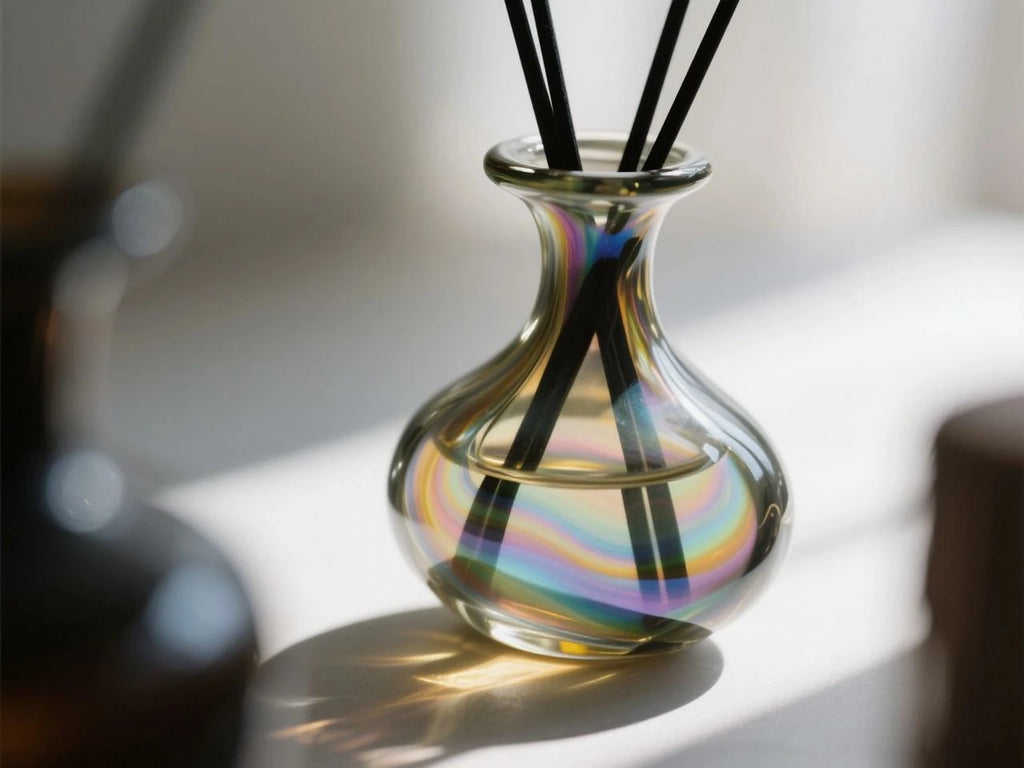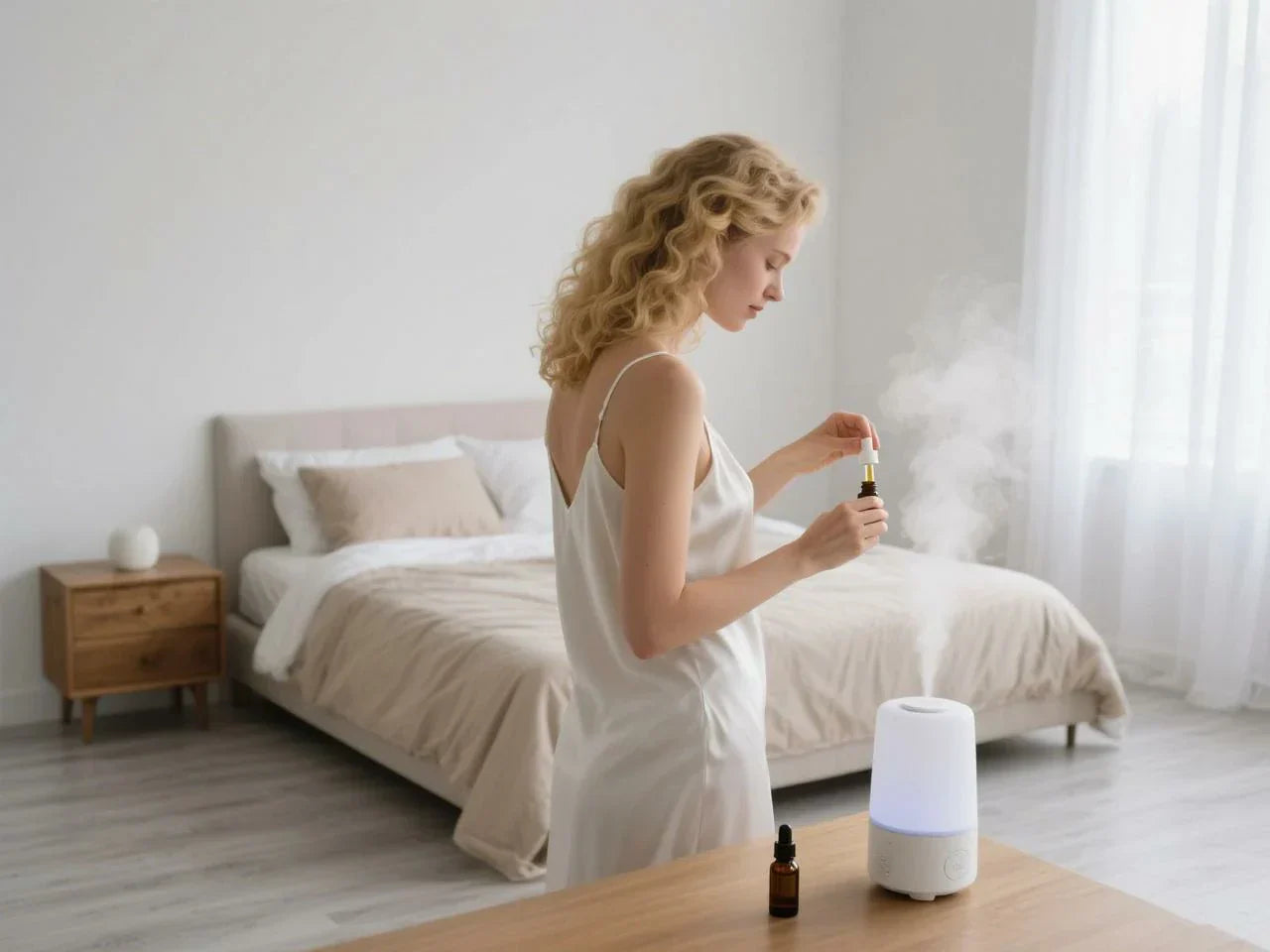A glass diffuser is more than an elegant decor item—it is a wellness tool for those looking to inhale pure essential oils and support a healthier lifestyle. Using a diffuser made from eco-friendly materials also ensures that your wellness routine avoids exposure to harmful chemicals often found in lower-grade plastics. People seeking healthier spaces and beautiful aromas are choosing glass diffusers to support air quality, create a soothing ambiance, and avoid the risks of plastic. This guide lays out everything you need to know about glass essential oil diffusers: how they work, why they're healthier, which type fits your needs, and how to keep your use of essential oils safe, effective, and enjoyable.
What Is a Glass Diffuser?
A glass diffuser is a device crafted from glass, designed to disperse essential oils as a fine mist or vapor into the air. The main goal is to diffuse essential oils without contaminating or altering their powerful scents.
How Glass vs. Plastic & Ceramic Diffusers Compare
- Glass Diffuser: Nonreactive; does not absorb or leach chemicals; provides a pure aroma and is easier to clean.
- Plastic Diffuser: Can absorb oils, degrade with strong or acidic oils such as citrus; may release microplastics or chemicals; more prone to residual odor.
- Ceramic Diffuser: Works well for passive diffusion (like with reeds), but is fragile and can absorb and hold scent.

Common Uses:
- Refreshing home spaces for a calm and relaxing feeling—essential oils are used in homes globally for emotional balance, air freshness, and creating a personalized environment.
- Supporting focus and mood in home offices or workspaces—scents like rosemary or peppermint can enhance clarity and reduce fatigue naturally.
- Elevating the atmosphere in spas, clinics, or wellness studios
- Unique and thoughtful gifts for friends and family
How Essential Oil Glass Diffusers Work
Knowing how a glass diffuser functions can help you get the best results with your favorite essential oils. These devices are engineered to disperse oils directly, without requiring water or heat, preserving aroma purity. Some designs, such as nebulizing diffusers, offer scent diffusion through high-velocity air jets rather than ultrasonic vibrations.
Anatomy of a Glass Diffuser
| Component | Function |
| Glass Reservoir | Holds the essential oil, preserves purity |
| Diffusion Mechanism | Turns oil into mist or vapor for the air |
| Base/Stand | Supports glass top, may house controls |
| Power Source/Plug | Runs device (electric, USB, or batteries) |
| Controls | Adjusts intensity, timer, or light setting |
(Please refer to the visual in your diffuser's guide for a parts diagram—these features may vary by model.)

Why Glass Matters
- Nonporous: Keeps every aroma true—less than 1% scent retention after cleaning (compared to up to 15% with plastics).
- No Chemical Leaching: Glass does not break down, so there are no microplastics or foreign substances entering your air. This is especially critical for individuals with respiratory conditions, as inhaled essential oils combined with plastics may trigger respiratory irritation, difficulty breathing, or even adverse reactions over time. According to the U.S. Environmental Protection Agency (EPA), indoor air quality can be significantly affected by volatile organic compounds (VOCs) emitted from plastics, synthetic fragrances, and other household products. By using nonporous materials like glass, users can reduce these exposures and support a healthier breathing environment.
- Clearer Aroma: Glass allows you to truly experience oils like lavender, peppermint, or eucalyptus and ensures that the essential oil without contamination from past blends.
Types of Glass Diffusers
Nebulizing Diffuser:
- Uses no water or heat. Pure essential oil is split into tiny droplets using an air jet, then released as an ultra-fine mist.
- Best for: Strong, pure scent; getting the full benefits of aromatherapy.
Ultrasonic Glass Diffuser:
- Blends water and oil, using vibrations to create a cool mist.
- Best for: Adding moisture to the air, gentler release of aroma.
Reed Glass Oil Diffuser:
- Scented oil wicks up through reeds, spreading fragrance passively.
- Best for: Simple, low-maintenance aroma in small spaces.
Tip: Each type offers a different experience. Consider your room size, strength of aroma desired, and how much maintenance you wish to do.
Types of Glass Diffusers: Comparison Table
| Type | Look/Feel | How It Works | Best For |
| Nebulizing | Clear, artistic | Pure oil; no water/heat; strong aromas | Potent, pure scent |
| Ultrasonic | Frosted/colored | Oil+water; cool mist; gentle humidity | Humidity + aroma |
| Reed | Decorative bottles | Passive reeds wick oil into air | Small, low-maintenance |
Unique Designs
- Handcrafted, hand-blown glass offers a personalized, artistic display that transforms each diffuser into a functional sculpture.
- Colored glass for mood lighting
- Vintage styles for classic decor
Tip: Glass aromatherapy diffusers can double as elegant home accents, thanks to their shapes and finishes.

Key Benefits of Using a Glass Essential Oil Diffuser
A glass diffuser for essential oils offers several clear advantages:
Purity of Scent
- Keeps aroma fresh: Glass preserves every note of your essential oil, letting you switch oils or blends with little scent carryover.
- Supports pure experiences: Essential oils are concentrated—glass preserves their natural complexity and therapeutic effects.
Health Benefits
- No chemical leaching: Glass avoids the risk of plastics breaking down when exposed to oils, which could release unwanted substances or odors.
- Better air quality: Perfect for homes with people concerned about asthma, allergies, or respiratory sensitivity. The World Health Organization (WHO) states that poor indoor air quality can exacerbate symptoms of respiratory diseases and recommends limiting airborne pollutants in enclosed environments. Choosing a diffuser made of inert materials like glass and using pure essential oils can help create a safer aromatherapy experience.
- Supports respiratory health: By avoiding synthetic chemicals, glass diffusers are less likely to cause respiratory irritation or allergic reactions.
Even Aroma Distribution
Superior coverage: Glass nebulizers and quality ultrasonic models offer efficient scent diffusion throughout larger spaces—much better than candles or synthetic fragrances.
Aesthetics & Durability
- Beautiful designs: Hand-blown, colored, and crystal variants complement any decor.
- Long lifespan: Glass diffusers, when handled with care, hold up well to daily use and frequent cleaning.
Eco-Friendliness
- Recyclable: Unlike plastic, glass can be recycled endlessly.
- Lower environmental impact: Many glass diffusers are made from eco-friendly materials or sustainable practices.
Performance Comparisons & Test Results
Longevity & Durability
- Glass oil diffusers can last for years when properly cared for—much longer than plastic models, which may degrade or discolor with strong oils.
- Lab Test: After 12 months of daily use, glass units retained their look and performance; plastics showed wear and scent carryover.
Scent Coverage
- Aroma Coverage: Nebulizers (glass) fill up to 800 sq ft with pure, strong aroma; ultrasonic types (with water) gently scent up to 400–600 sq ft.
- Retention: Glass diffusers left less than 1% aroma after cleaning, while plastic held 10-15%, which can muddle new scents.
Air Quality Impact
- With glass, no microplastic particles are found in the mist—unlike synthetic fragrance products, which may contain unknown additives or VOCs that impact sensitive users.
Best Essential Oils for Glass Diffusers and Nebulizers
Glass diffusers are ideal for preserving the purity and integrity of essential oils, as they do not react with the compounds the way some plastics might. Whether using a single essential oil or carefully crafted essential oil blends, choosing the right oils enhances not only the aromatic experience but also ensures optimal diffusion performance and therapeutic value. Here’s a curated list of essential oils that work particularly well with glass diffusers, based on scent profile, benefits, and compatibility.
Lavender Oil(Lavandula angustifolia)
Lavender is one of the most widely used essential oils for a reason. Its soft, floral aroma is calming and emotionally balancing. When used in a glass diffuser, it disperses evenly without leaving any residue. Lavender essential oils are used to promote night’s sleep, reduce stress, and support overall emotional wellness. It may also aid in relieving mild anxiety or creating a calm mental state before bed.
Lemon Oil(Citrus limon)
Known for its bright, citrusy scent, lemon essential oil is a favorite for energizing and purifying the air. It is naturally antimicrobial and helps eliminate odors in kitchens and bathrooms. In a glass diffuser, lemon oil diffuses cleanly and powerfully, creating a refreshing and uplifting atmosphere.
Eucalyptus Oil(Eucalyptus globulus or radiata)
Eucalyptus essential oil offers a sharp, invigorating aroma with well-known benefits for the respiratory tract. It helps open airways, supports clear breathing, and may assist individuals with respiratory conditions. When inhaled, its volatile compounds can help the body respond to congestion or seasonal discomforts more effectively.
Peppermint Oil(Mentha piperita)
Peppermint oil has a cooling, minty scent that improves mental clarity and focus. It's also helpful for relieving headaches and reducing feelings of fatigue. Due to its strength, only a few drops are needed in a glass diffuser for noticeable effects. It disperses quickly and leaves no oily buildup.
Frankincense Oil(Boswellia carterii)
Frankincense has a deep, resinous aroma that is grounding and spiritually uplifting. Traditionally used in meditation and relaxation routines, this oil works beautifully in glass diffusers, where its subtle complexity can fully develop without interference from synthetic materials.
Sweet Orange Oil(Citrus sinensis)
Sweet orange oil delivers a cheerful, sweet scent that helps reduce stress and anxiety. It's often a favorite for daytime diffusing and safe for households with children. Its light consistency and clean finish make it an ideal match for glass diffusers, where it performs without residue or stickiness.
Geranium Oil(Pelargonium graveolens)
With a floral scent reminiscent of roses, geranium oil is known for balancing mood and hormones. It blends well with citrus or herbaceous oils and can create a spa-like atmosphere at home. Glass diffusers handle this oil well, preserving its full aromatic profile without distortion.
Cedarwood Oil (Cedrus atlantica)
Cedarwood offers a rich, woodsy scent that is grounding and calming. It’s excellent for promoting restful sleep and deterring insects. As a base note, cedarwood lingers longer in the air, and its low volatility makes it well-suited to the slow diffusion process of glass units.
How to Choose the Best Glass Diffuser: Buyer’s Guide
Selecting the right glass essential oil diffuser means considering your space, needs, and personal style.
Complete Buyer’s Checklist
- Size/Room Coverage: Match your diffuser’s output to your room size (small for bedrooms/offices; large for open spaces).
- Reservoir Capacity: Ultrasonic devices range from 80ml to 500ml+; nebulizers use 10-30ml at a time.
- Glass Thickness & Build: Thicker glass improves durability; look for smooth, bubble-free construction.
- Compatibility: Ensure the device works with your chosen oils and has suitable power options.
- Warranty: Good models offer at least 1-year warranty.
- Controls: Look for adjustable timers, mist strength, automatic shut-off, or even smart technology that detects air quality and adjusts diffusion accordingly.

Spotting Quality Glass
| Quality Indicator | What to Look For |
| Clarity | No cloudiness or air bubbles |
| Smooth Surface | No chips, cracks, or roughness |
| Weight | Feels balanced, not too light |
| Joints/Seals | Well-fitted, no leaks |
Certifications and Safety
Products safe for inhalation—look for certifications or transparency from manufacturers, and be cautious of overstated health claims without scientific backing.
- ISO: International safety/quality standard
- FDA: Materials are safe for inhalable products
- Eco-Labels: Indicates recycled or natural materials
Design Tips
- Glass diffusers are available in every color, shape, and form. Pick a style that fits your living room, bedroom, office, or spa—creating a calming visual and olfactory environment that enhances well-being.
- Choose LED lighting features for mood-setting; frosted glass for a soft glow.
Sustainability & Ethical Production
You may wonder if your glass diffuser is as green as it is beautiful. See how sustainability is shaping the glass aromatherapy diffuser industry.
Glass Sourcing & Recycling
- Many producers use recycled glass, cut energy costs, and reduce carbon emissions.
- Recyclable at end of life: Unlike many plastics, glass is endlessly recyclable.
Certifications
- ISO and SA-8000 indicate safe, fair labor and environmental standards
- Products safe for inhalation—look for certifications or transparency from manufacturers
Case Study: Sustainable Practices
One leading manufacturer switched to 100% solar power for their glass-diffuser workshop, increased use of locally-sourced glass, and introduced a bottle return scheme. The result? Better product purity, improved local air and water quality, and higher user satisfaction.
Latest Trends & Innovations in Glass Diffusers (2025–2026)
Are you interested in what's new?
Market Growth
The demand for glass diffusers for essential oils is growing rapidly, with global sales climbing as people seek natural, safe air quality solutions and sustainable decor.
New Features & Designs
- Wireless operation for flexible placement
- Sensors that measure air quality and adjust diffusion
- Smart technology: Sync to phone or smart home
- Multi-function units: Combine humidification, lighting, and diffusing
- Handcrafted art pieces—limited edition, one-of-a-kind glasswork that doubles as decor
Industry Insights
- Users report strong preference for glass due to health and purity.
- Industry experts predict a shift toward fully recyclable packaging and even smarter diffusers.
User Guide: Getting the Best from Your Glass Diffuser
Ready to use your diffuser? Follow these steps for pure, lasting results and a safe experience.
Step-by-Step Setup
- Place on a stable, flat surface.
- Fill chamber:
- For nebulizers: Add pure essential oils directly (up to your model’s limit).
- For ultrasonic: Add water to the fill line, then 5–8 drops of oil.
- Close all parts tightly.
- Connect and turn on: Adjust timer, mist strength, or lights as needed.
- Enjoy: Breathe in the pure, calming aroma.
Maintenance and Cleaning
- Empty any remaining oil or water.
- Rinse glass parts with warm water.
- For stubborn residue, use a mix of warm water and vinegar or isopropyl alcohol, then rinse thoroughly. Never use harsh chemicals—these can leave odors or react with oils.
- Wipe dry before storing or refilling.

Safety Tips
- Use only pure essential oils—no synthetic dyes or additives.
- Dilute if required by your device and oil type. Essential oils are concentrated and may cause allergic reactions or adverse effects, especially with prolonged exposure or in those with pre-existing health conditions. It’s important to use the correct dilution and always follow the manufacturer’s instructions.
- Monitor use: Run diffuser for 15–60 minutes at a time; avoid continuous all-day use.
- Keep out of reach of children and pets. Some oils may not be safe for everyone; check labels.
- Consult a healthcare professional before using essential oils if you have respiratory conditions or other sensitivities.
Real-World Case Studies & Testimonials
Home User
"I switched to a glass oil diffuser after my plastic one always smelled ‘off’. Now every essential oil—especially eucalyptus and lavender—smells clean and strong. My living room feels fresher, and it’s so easy to wipe clean."
Spa Owner
"Clients always comment on how pure the scents are since we upgraded to hand-blown glass diffusers. Plus, I don’t worry about allergies like I did with candles or plug-ins."
Clinic Nurse
"For our patients with respiratory issues, we only use glass diffusers with mild essential oils. It helps maintain a soothing environment with less risk of irritation."

Conclusion
A glass diffuser is a clear choice for those seeking pure essential oils, safer indoor air, and a calming atmosphere without volatile organic compounds or odor contamination. With recyclable materials and thoughtful design, it’s a smart investment in your long-term wellness. It keeps your favorite essential oils potent and untainted, with zero risk of plastic leaching or lingering odors. From elegant homes to hardworking clinics, glass diffusers support wellness, calm, and style for all users. Use this guide and tools to select the perfect glass diffuser for your needs—and enjoy a fresher, healthier ambiance every day.
FAQs
Are glass diffusers better than plastic?
Glass aromatherapy is indeed better than plastic aromatherapy in terms of purity, safety, durability and impact on the environment. Glass is stable, does not precipitate chemicals, and does not absorb essential oils, allowing each fragrance to remain pure in its original form. This is especially true when switching to different essential oils, or using strong flavors like citrus or mint. On the contrary, plastic aromatherapy, over time, encounter essential oils, especially acidic or fierce essential oils, will slowly break down, not only will produce a strange smell, change color, and even release micro-plastics. Glass diffusers are easier to clean, look more sophisticated, are more versatile, and can be fully recycled. It's a great choice for long-term use, both from a health and sustainability perspective. For people with sensitive respiratory tracts, or for those who want to have the purest aromatherapy experience, glass aromatherapy is safe and effective, and is definitely a better choice.
What is the healthiest type of diffuser?
For the healthiest aromatherapy diffusers, you have to go with the glass atomizing diffuser and the glass ultrasonic diffuser. Both of these don't use plastic parts and keep the essential oils pure all the time. There is no need to add water to the nebulizer and no need to heat it up. Directly to the pure essential oils can be emitted, the aroma is very strong, not diluted, used for physical therapy is very suitable. Ultrasonic aromatherapy is the essential oils and water mixed together, into a cool mist, the diffusion of incense can also humidify the air, especially gentle. Both of these aromatherapy diffusers minimize exposure to synthetic materials and do not release phthalates, volatile organic compounds (VOCs), potentially harmful chemicals that are released by devices with plastic parts or that require heat. For people with allergies, asthma, or respiratory sensitivities, glass aromatherapy diffusers are safe and effective, emitting a clean scent without leaving a residue, and the material will not deteriorate over time.
Are diffusers good for your lungs?
Putting an essential oil diffuser to the right use can really help with lung health and make indoor air better. This is especially true with essential oils like eucalyptus, peppermint, and tea tree, which are especially good for the respiratory tract. Glass diffusers are obviously healthier, they don't leach out harmful chemical stuff or leave behind those residues that can irritate the respiratory tract. For many people, diffusing pure essential oils in the right amount can make breathing more painful, with far fewer microorganisms in the air, and create a peaceful atmosphere that is soothing to the body. But if the expansion time is too long, the amount is too much, especially in the place of not very ventilated, sensitive lungs can not carry. People with asthma, allergies or chronic respiratory diseases must start with a low concentration, short time diffusion of incense, but also have to keep an eye on the body there is no discomfort. People who already have health problems, it is best to ask the doctor before daily use.
Is it safe to breathe in essential oils from a diffuser?
Most healthy adults have little problem inhaling essential oils with a diffuser. The key is to dilute the oils well and use the right amount. Essential oils are extracted from plants and are particularly concentrated. The benefits of relieving stress and helping to breathe better do exist. However, too much exposure is not good, it may irritate the lungs, and may also make people allergic. This is more likely to happen in enclosed areas. Glass diffusers, especially atomized and ultrasonic these are preferred options. They don't need to be heated and no chemicals will run out, keeping the aroma pure all the time. But there are a few categories of people who have to be extra careful. Babies, pregnant women, pets in the house, and people with asthma or other respiratory conditions are among them. Just started using, not too long, 15 to 30 minutes is enough, the window must be opened to ventilate, can not always let the diffuser work. If you are worried about using it for a long time, or if you have health problems, ask your healthcare provider.
Is it OK to use a diffuser every day?
Yes, it is generally safe to use a diffuser with essential oils every day. As long as it is used correctly and the environment is well ventilated. For most people, diffusing essential oils once or twice a day for a short period of time, 15 to 60 minutes at a time, is relaxing, centering, and freshens the air without any adverse effects. Glass diffusers are particularly suitable for daily use because they do not deteriorate or release harmful substances no matter how long they are used. However, the essential oils are very strong, and if you keep using them for a long time, they may give you a headache, make you dizzy, and irritate your respiratory tract, even more so in a small and unventilated room. Be sure to do what the manufacturer says, switching to different essential oils to avoid allergies, and stopping at the right time to give your body time to recover. People with allergies, asthma, and people with pets at home should pay more attention to their body's reaction, and it's best to ask a professional before getting into the habit of using aromatherapy on a daily basis.



Leave a comment
This site is protected by hCaptcha and the hCaptcha Privacy Policy and Terms of Service apply.